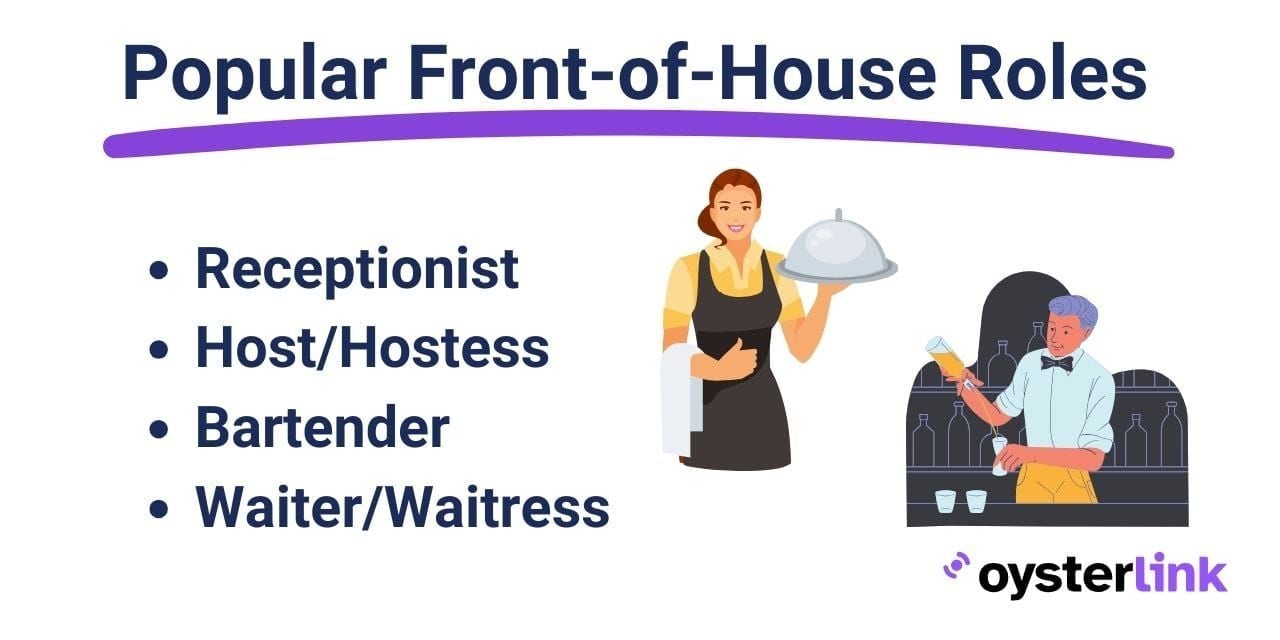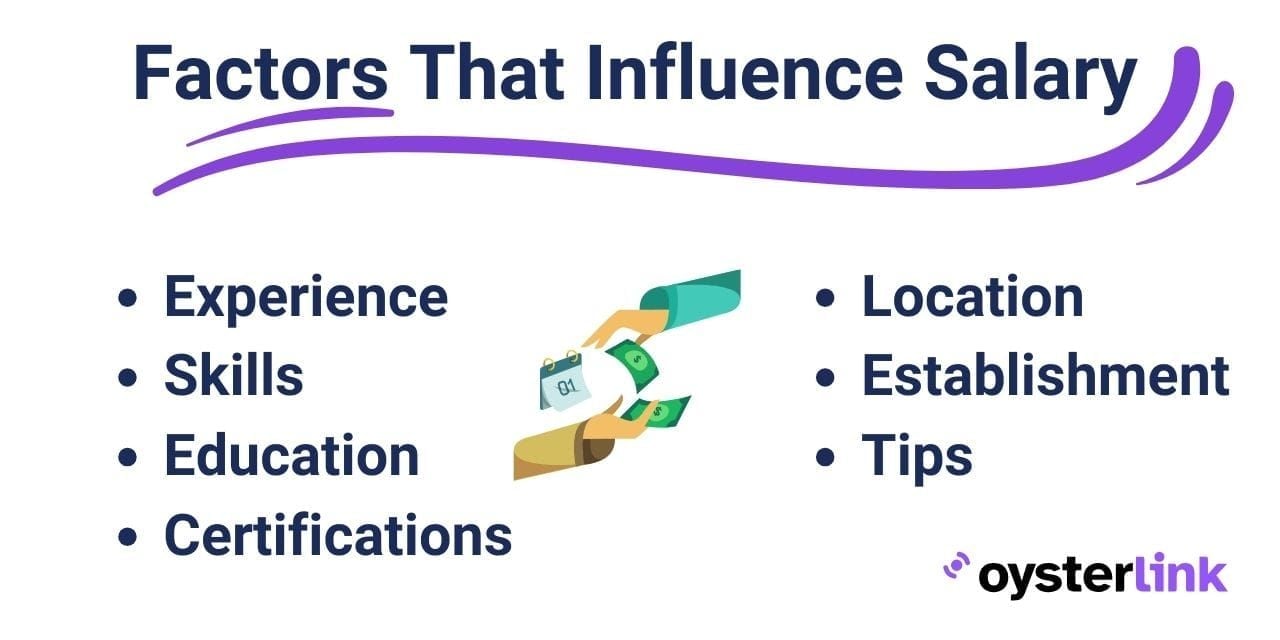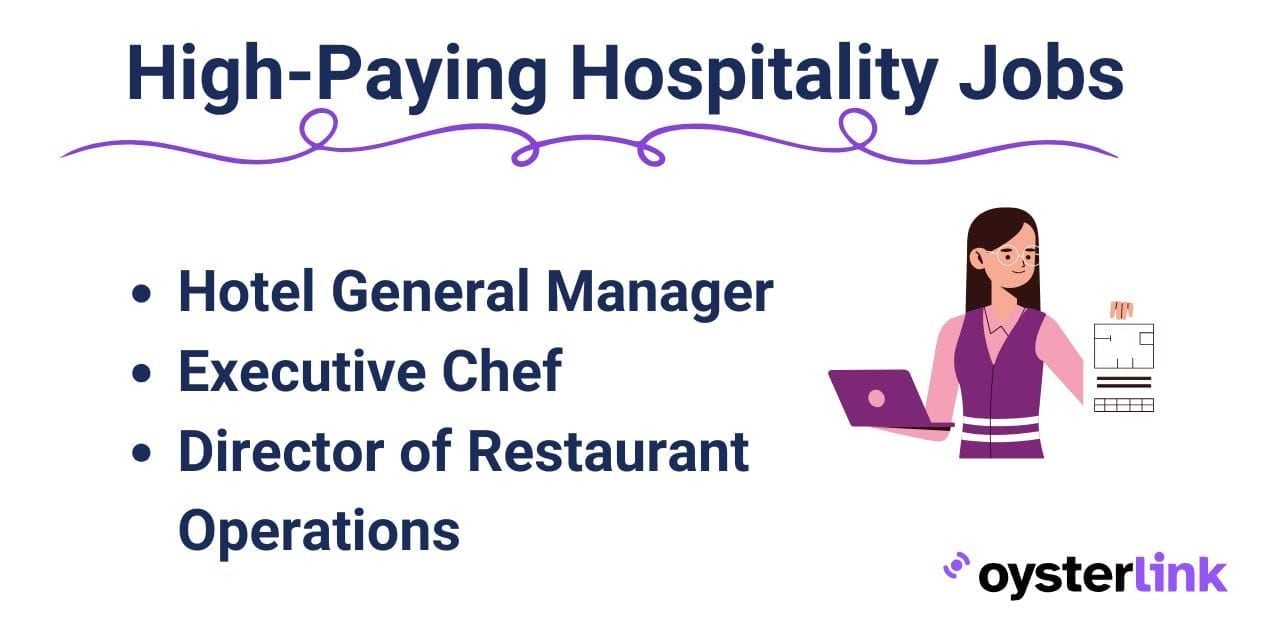Check Our Career Growth Tools
Salaries
Learn how much you could earn in the restaurant and hospitality industry. OysterLink’s collection of Salary Guides provides compensation insights for over 40 restaurant and hospitality jobs in the United States:
- Salary trends per state
- Data on major cities like NYC, New York and Miami, Florida
- Factors that affect compensation
Each Salary Guide also contains salary comparisons for different professions, a list of top skills you need to negotiate higher pay and FAQs
Overview of Hospitality Industry Salaries
Those who start in entry-level roles in hospitality have opportunities to advance and earn more, especially as they gain experience. The industry rewards both customer service skills and managerial expertise, creating a ladder for motivated individuals to move up and achieve higher earnings.Read More
Hospitality Industry Salary by Role
The hospitality industry comprises various sectors, each with unique salary expectations. Those working in hotels and lodging earn similar salaries compared to those working in restaurants, with managerial positions earning more than entry-level roles.
Hospitality Management Salary
Hospitality managers in high-end hotels or restaurants typically earn more than those in smaller, independent venues. Entry-level positions in hospitality management can start at around $40,000 per year, with mid-level managers earning between $50,000 and $70,000.
Senior-level managers, especially in major cities or luxury brands, may see annual salaries above $100,000. Beyond base pay, managers often benefit from bonuses, travel perks and health benefits, making hospitality management a rewarding field for those with strong leadership and customer service skills.
Roles in hospitality management include Restaurant Manager, Kitchen Manager, Hotel Manager, Director of Hospitality and Director of Restaurant Operations. Other common part-time or contract roles include Restaurant Consultant and Hospitality Consultant. Establishments typically hire for these roles when they’re looking to make large changes and need expert guidance from an independent third-party who won’t be biased.
Front-of-House Salaries
Front-of-house (FOH) roles are essential to hospitality, covering positions that directly interact with customers. In restaurants, hotels and other service settings, FOH staff are the ones who greet the customers, assist them with seating and manage their orders and requests. If you’re considering a role as a Receptionist, Host/Hostess, Waiter/Waitress or Bartender, it’s helpful to know what these jobs generally pay.
Salaries for each of these roles vary greatly depending on your location and experience level. They can be as low as $10 per hour and as high as $30 per hour or even more, which equates to $20,000 per year and well over $60,000 per year. If you factor in tips and you work in a high-end establishment, you can easily earn six figures per year.

If you thrive on customer interactions and enjoy working in a fast-paced environment, a FOH role offers a rewarding career path. Check out the hospitality positions above to see the salary breakdown for each role and to get a more accurate estimate of what you can earn.
Back-of-House Salaries
Back-of-house (BOH) roles form the backbone of any restaurant, hotel kitchen or catering service. From preparing food to maintaining cleanliness and efficiency, BOH staff work behind the scenes to ensure everything runs smoothly. If you’re considering a career in these roles, it’s helpful to understand the range of salaries for positions like Line Cook, Prep Cook, Dishwasher, Food Runner and Chef, among others.
Although BOH positions don’t typically receive tips, in some restaurants that utilize tip pooling, the tips can be split evenly among both FOH and BOH employees. The salary range for BOH roles is similar to that of FOH, in that it can range greatly, from $20k per year to well over $100k for Head Chefs in large restaurant chains.

If you like preparing or cooking food and you love spending time in a commercial kitchen, then a BOH role is an excellent career path. Above, you can find links to various hospitality positions that will show you what you can expect to earn in each role.
Factors That Influence Salary in Hospitality
Many factors influence what hospitality workers earn. From experience and location to the type of venue, each element plays a role in determining salaries. If you’re looking to grow your earnings in hospitality, understanding these key factors can help you strategize.
Experience
Experience is one of the biggest influences on salary in hospitality. For both front-of-house and back-of-house roles, seasoned professionals are often rewarded with higher pay. Those who’ve worked in similar positions for years are likely to earn more due to their ability to handle fast-paced environments and customer demands. For example, an experienced Bartender or Head Chef brings a level of expertise that makes them more valuable to employers. They require less training and can adapt to their new role much quicker.
Skills
Specific skills can significantly impact pay rates, especially if they’re specialized. For instance, Bartenders with mixology skills, Chefs trained in international cuisine or Event Planners with strong organizational skills can often negotiate higher wages. Additionally, soft skills like communication, problem-solving and teamwork are crucial in hospitality, as they contribute to smoother service and customer satisfaction.
Education and certifications
Formal training and certifications can open doors to higher-paying roles. For example, Chefs with culinary school backgrounds or certifications in food safety and hygiene tend to earn more than those without. Certifications in management or hospitality administration are also valuable for individuals aiming for leadership roles, which typically offer better pay.
Location
Location heavily influences salaries in the hospitality industry. In major cities like New York, Los Angeles and Chicago, where the cost of living is higher, wages are often higher too. Coastal or tourist-heavy locations also tend to pay more due to high demand, particularly during peak seasons. Conversely, in smaller towns or rural areas, salaries might be lower, reflecting the lower local demand.

Type of establishment
The type of venue significantly affects earnings. Fine dining restaurants, luxury hotels and high-end bars often pay more due to the high expectations of service and skill. On the other hand, fast-casual or chain restaurants typically offer more modest wages. Working at a prestigious or upscale venue not only boosts pay but also adds experience and credibility to your resume, which can lead to future opportunities.
It’s the reason why Fine Dine Servers on average earn nearly $20,000 more per year than Servers, even though they share many of the same duties and responsibilities. It’s just that the expectations from Servers working in fine dining establishments are that much greater.
Tips
In many hospitality roles, tips play a large part in overall earnings. Front-of-house positions like Servers, Hosts/Hostesses and other hotel staff who interact directly with guests often earn tips that can equal or exceed their hourly wages. In fine dining or high-end venues, tips tend to be higher, reflecting the larger bills and generous clientele. While back-of-house positions like Chefs and Cooks generally don’t receive tips, some restaurants now offer tip-sharing programs, helping to boost earnings across the team.
Benefits and Perks Beyond Salary
In addition to base salaries, hospitality roles often come with a range of perks that make them even more attractive. Management-level positions, especially in high-end hotels and restaurants, typically offer health insurance, retirement plans, paid time off and performance bonuses.
Many roles also provide employee discounts on accommodations, dining or services, allowing staff to enjoy travel and dining experiences at a fraction of the cost. Some large hotel chains even offer global travel benefits, which is an excellent perk for those who enjoy exploring new places. These benefits, combined with flexible scheduling and the potential for tips in some roles, make hospitality an excellent industry to build your career in.
Career Progression in Hospitality
Hospitality is a field that offers substantial upward mobility. Entry-level employees, like Servers, Hosts/Hostesses and Waiters/Waitresses can often work their way up to supervisory or management roles with experience, strong performance and a dedication to customer service.
Career progression is particularly fast-paced in hospitality compared to other industries, as businesses frequently promote from within to build loyalty and retain skilled workers. Many hospitality professionals start in lower-level roles and move up to become Restaurant Managers, Kitchen Managers or even Hotel General Managers. This progression allows employees to steadily increase their earnings and responsibilities while gaining invaluable hands-on experience in service and leadership.
Impact of Seasonality on Hospitality Salaries
Seasonality plays a significant role in hospitality earnings, especially in tourist-heavy locations. During peak seasons, such as summer in beach resorts or winter in ski destinations, demand for staff increases, often leading to higher wages and more available work hours.
Employees in these areas may benefit from overtime or seasonal bonuses to handle the surge in guests. However, during off-peak months, some hospitality roles may face reduced hours or temporary layoffs. For workers in seasonal roles, planning around this fluctuation is key to maintaining a steady income, and some employees opt for flexible part-time work in other industries during slower months.
Which Hospitality Job Pays the Most?
In the hospitality industry, the highest-paying job is usually the Hotel General Manager, particularly in luxury hotels and resorts. Hotel General Managers have significant responsibilities, overseeing all aspects of hotel operations, including guest satisfaction, financial performance and team management. The best-paid Hotel General Managers earn well over $200k per year.

Other high-paying hospitality roles include Executive Chefs and Directors of Restaurant Operations, especially at prestigious restaurants and luxury establishments, where salaries often reach six figures depending on location and experience. Additionally, specialized roles like Restaurant Consultant can command high fees, especially if they have a strong track record.
What Is the Income in Hospitality?
Income in hospitality varies widely depending on the position, level of experience and the specific sector. Entry-level roles, such as Receptionist, Server and Housekeeper, typically earn less compared to mid-level roles like Sous Chef, Bartender and Assistant Restaurant Manager.
How Much Do Hospitality Workers Get Paid in the USA?
In the United States, pay for hospitality workers varies significantly based on job type, location and experience. Entry-level roles like Dishwasher and Host/Hostess earn less than managerial positions like Kitchen Manager or Hotel Manager, but those working in entry-level roles can easily climb the ladder with a few years of experience under their belt.
Which Country Pays the Highest Salary for Hospitality Management?
[source: Statista]
As you can see from the table above, the United States tops the charts when it comes to the highest-paid salaries in hospitality management. However, keep in mind that this is just the average salary which is extremely high because of the amount of industry professionals with decades of experience who earn upwards of $1,000,000 per year.
Who Makes the Most Money in Hospitality?
In the hospitality industry, corporate executives and senior management roles make the most money. Positions such as Chief Executive Officer (CEO), Chief Operations Officer (COO) and Vice President at major hotel chains or luxury resort groups tend to have the highest earnings. Salaries for these roles can range anywhere from $200,000 to well over $1 million annually, especially when factoring in bonuses, profit-sharing and stock options.
At the property level, the highest-paying role is typically the Hotel General Manager or Director of Restaurant Operations. Beyond the hotel sector, roles like Restaurant Consultant and Executive Chef (especially those with branded restaurant chains or large media presence) also see high earnings, often surpassing $200,000, depending on experience, reputation and location.
Is Hospitality Profitable?
Yes, the hospitality industry can be extremely profitable, but that profitability depends heavily on factors such as location, business type, market demand and various other economic conditions. High-end establishments such as luxury hotels, fine dining restaurants and exclusive resorts often yield higher profit margins due to premium pricing.
However, smaller or independent establishments may face tighter margins due to high operational costs, labor expenses and high competition. Economic fluctuations, seasonal demand and external events (like global pandemics) can also significantly impact profitability.
Working in hospitality isn’t easy since it requires determination and effort, but it’s extremely profitable for anyone looking to make a name for themselves and be the best in their field. What makes hospitality so attractive is the fact that anyone can climb the ladder with enough time, effort and experience.
Future Salary Trends in Hospitality
The future of hospitality salaries is influenced by trends like automation, shifts in customer expectations and labor shortages. As hospitality businesses adopt technology for tasks like booking, ordering and check-ins, the demand for specialized tech-savvy staff is rising, which could push salaries higher for these roles.
The industry is also responding to increased demand for sustainability and unique, personalized experiences, which may lead to new positions or niche roles that come with competitive pay. Examples of these include Sleep Concierges in hotels and Gaming Managers in hotel casinos.